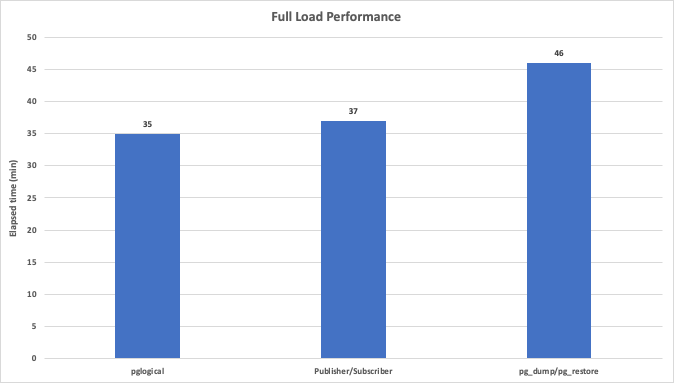Full load PostgreSQL database migration options performance comparison
We analyzed the performance of pg_dump and pg_restore, publisher and subscriber, and pglogical in a full load migration. We migrated a 70 GB database that includes 6 tables and LOB data. We lifted and shifted this database from the source to the target.
The following image represents the performance comparison of the three migration methods. We expect similar performance trends for larger datasets.

We performed this test to provide a basic overview of the full load performance. This performance may vary because it depends on such factors as network bandwidth, data structure, data size, and so on.
The elapsed time shown in the diagram is the actual migration time. It doesn’t include the time spent on implementing prerequisites.
You can compare the results of all three methods.
-
35 minutes is the total elapsed time for pglogical.
-
37 minutes is the total elapsed time for publisher and subscriber.
-
46 minutes is the total elapsed time for pg_dump and pg_restore. This time includes:
-
19 minutes to unload data using pg_dump.
-
27 minutes to load data using pg_restore.
-
From the comparison, you can see that pglogical has the best performance among the three full load options. Consider this approach if you don’t need to migrate secondary database objects such as views, stored procedures, triggers, and so on. This is the preferred approach where the database size is greater than 100 GB and when you don’t have transformation or filtering requirements.
Publisher and subscriber may be appropriate if you don’t need to migrate secondary database objects such as views, stored procedures, triggers, and so on. You can use publisher and subscriber for smaller migrations where ease of use considerations override the minor performance gains provided by pglogical.
Using pg_dump and pg_restore is slower than both pglogical and publisher and subscriber. pg_dump is the only option that migrates your secondary database objects. Additionally, data files created by pg_dump may be orders of magnitude larger than the original table size.